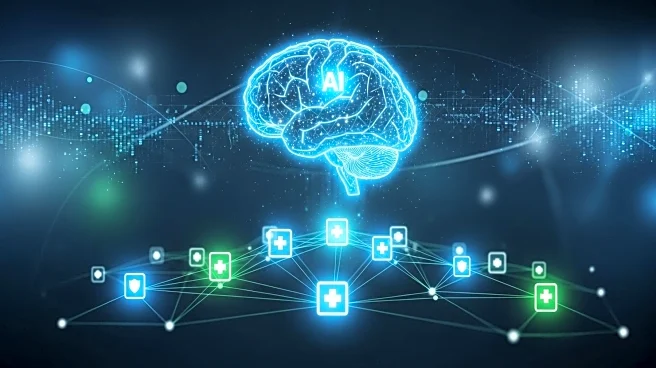What is the story about?
What's Happening?
Artificial intelligence (AI) is increasingly being utilized in the healthcare sector to enhance security measures, particularly in detecting insider threats. These threats, posed by individuals within an organization such as employees, contractors, and vendors, can lead to significant security risks due to their authorized access to sensitive data. AI systems are being employed to analyze vast amounts of data in real-time, identifying behavioral anomalies and potential threats more efficiently than traditional methods. Techniques such as machine learning and natural language processing (NLP) are used to monitor user behavior, assess risk, and analyze communications for signs of policy violations or malicious intent. This approach allows for quicker and more precise responses to potential threats, reducing the risk of data breaches and improving overall security in healthcare organizations.
Why It's Important?
The integration of AI in healthcare security is crucial due to the increasing digitization of medical records and the sensitive nature of patient data. Insider threats are particularly challenging to detect and can result in costly breaches if not addressed promptly. By leveraging AI, healthcare organizations can better protect patient information, reduce the risk of data loss, and maintain compliance with privacy regulations. The ability of AI to automate threat detection and response processes also alleviates the workload on IT teams, allowing for more efficient use of resources. As the healthcare industry continues to evolve, the adoption of AI-driven security measures is likely to become a standard practice, ensuring the safety and integrity of patient data.
What's Next?
As AI technology continues to advance, its role in healthcare security is expected to expand. Future developments may include more sophisticated AI models capable of predicting potential threats before they occur, further reducing the risk of data breaches. Additionally, the integration of AI with electronic health record (EHR) systems will likely become more seamless, providing continuous monitoring and compliance checks. Healthcare organizations may also explore the use of AI in other areas, such as patient care and administrative processes, to enhance overall efficiency and effectiveness. Stakeholders in the healthcare industry, including policymakers and technology providers, will need to collaborate to ensure the ethical and secure implementation of AI technologies.
Beyond the Headlines
The use of AI in detecting insider threats raises important ethical considerations, particularly regarding privacy and data protection. While AI can significantly enhance security, it is essential to ensure that monitoring practices do not infringe on individual privacy rights. Healthcare organizations must balance the need for security with the ethical obligation to protect patient and employee privacy. Additionally, as AI systems become more integrated into healthcare operations, there will be a need for ongoing training and education for staff to effectively utilize these technologies and understand their implications.















